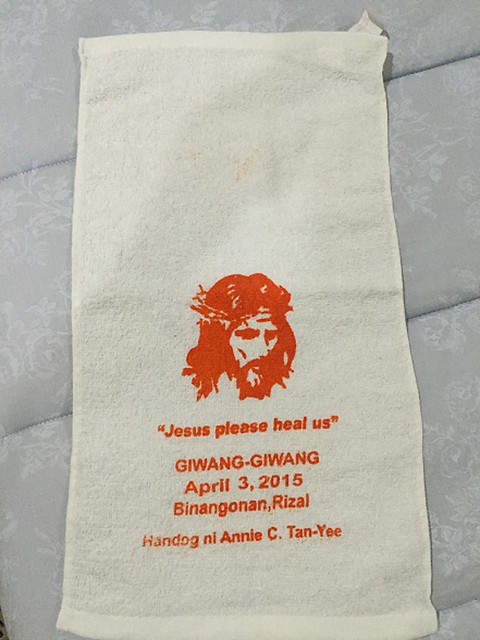As part of our yearly panata, we gave away 1,500 white towels last Good Friday to the male devotees who carried the Santo Entiero, or Santo Sepulcro, or what’s referred to in our town during my time as Giwang-giwang.
Binangonan folks, it’s giwang-giwang, NOT gewang-gewang.
I chose to print the words giwang-giwang because this is what was in my childhood memories. This is what is memorable to me.
We heard someone saying that the print on the towel was wrong. Mali daw ang spelling. He said it should be gewang-gewang, spelled with an e.
That’s wrong. No such Tagalog word as gewang-gewang. Swaying is translated in Tagalog as gumigiwang. Giwang also means wobble or wobbly. It is pronounced with a long i and not with an e.
The term giwang-giwang came about because thousands of men wanted to carry the carriage bearing the body / statue of the dead Jesus. They would all try to squeeze into each other’s sweaty shirts and bodies to be able to touch the wooden carriage. Those that were lucky enough to put their arms around the 3″ x 10″ thick beam would close their eyes and just hang on to their dear lives until the end of the procession.
Those outside of this core would try to push their way in which resulted to the carriage swaying in all directions and sometimes dropping to the ground sideways. When it’s able to move, it’s wobbly and criss-crosses the road at times even moving backwards. That’s how people started referring to it as giwang-giwang.
I grew up not knowing what it was really called. Every person, kid, young and old, referred to it as that. Giwang-giwang. It’s the dead Jesus, Santo Entiero or Entierro.
I am a disappointed that people in Binangonan now refer to it as gewang-gewang. There is no Tagalog word gewang. Maybe the wrong pronunciation and influence came from people who migrated to our town from other provinces.
Please take note of the correct pronunciations :
Sitaw NOT setaw, you want in English? It’s string beans, not streng bens.
Bibingka NOT bebengka
Dahon ng sili NOT dahon ng sele
Sila ay nagswimming ng nakabikini NOT Sela ay nagswemmeng ng naka bekene.
Waikiki NOT Waikeke.
The correct word and pronunciation is Giwang-giwang.



That’s how language works. It evolves, whether we like it or not. =) I’m also a native from Binangonan and I actually don’t mind gewang-gewang because as far as I can remember, literally all of us referred to it exactly with that spelling and pronunciation.
Roughly paraphrasing, a procession by any other name, sa simbahan pa din ang bagsak.
Hi Jeremy,
You may call it whatever you wish, there’s nothing wrong with that. Yes, we do know we refer to the same thing, however, I still think it should be pronounced as giwang-giwang and not gewang-gewang. Although I understand that some people pronounce adobo as adubu, that doesn’t mean the word adobo is evolving. It’s not okay to say that I am from Benangonan.
I appreciate you sending your comment. Regards.